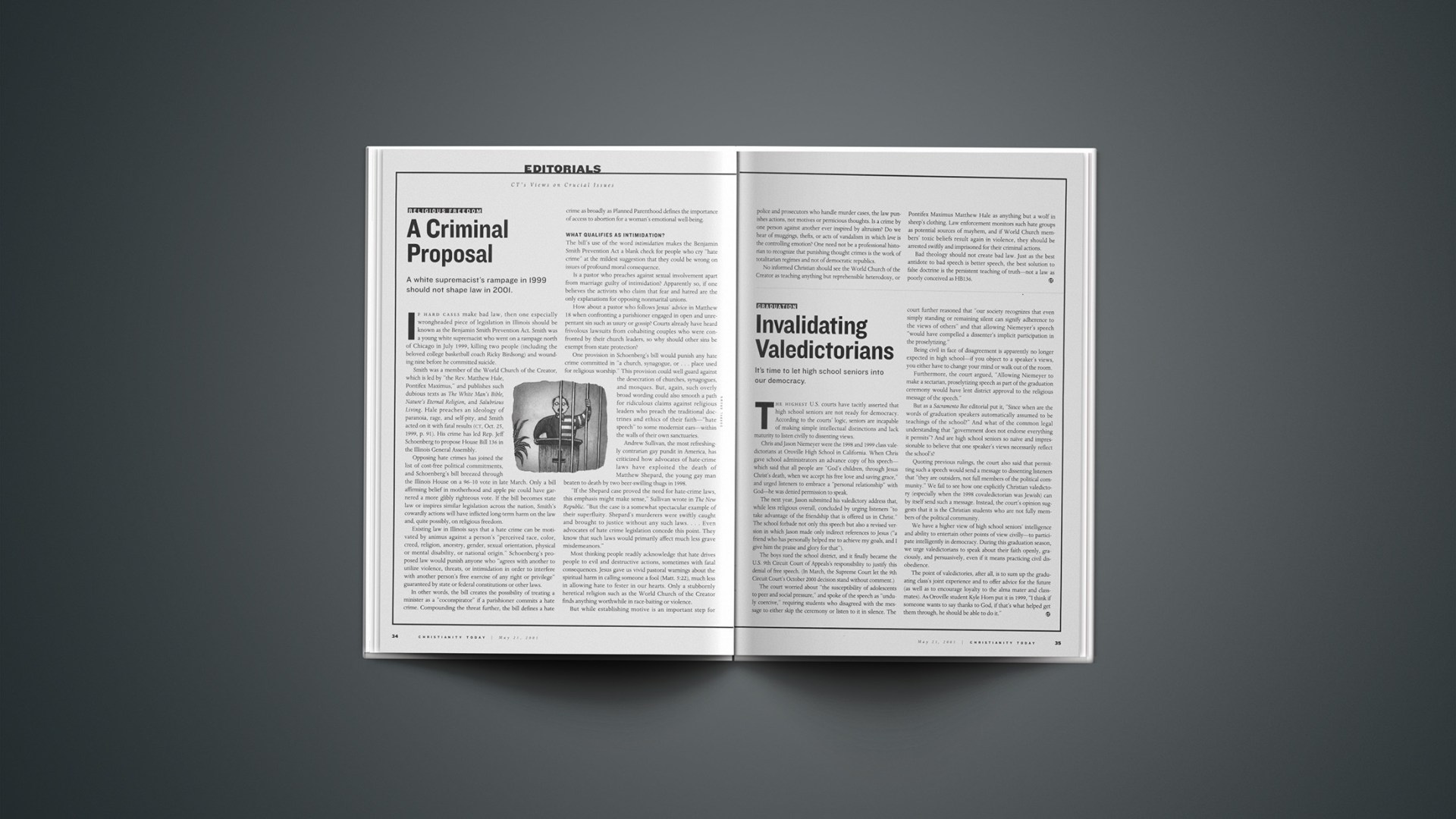Chris and Jason Niemeyer were the 1998 and 1999 class valedictorians at Oroville High School in California. When Chris gave school administrators an advance copy of his speech—which said that all people are “God’s children, through Jesus Christ’s death, when we accept his free love and saving grace,” and urged listeners to embrace a “personal relationship” with God—he was denied permission to speak.
The next year, Jason submitted his valedictory address that, while less religious overall, concluded by urging listeners “to take advantage of the friendship that is offered us in Christ.” The school forbade not only this speech but also a revised version in which Jason made only indirect references to Jesus (“a friend who has personally helped me to achieve my goals, and I give him the praise and glory for that”).
The boys sued the school district, and it finally became the U.S. 9th Circuit Court of Appeals’s responsibility to justify this denial of free speech. (In March, the Supreme Court let the 9th Circuit Court’s October 2000 decision stand without comment.)
The court worried about “the susceptibility of adolescents to peer and social pressure,” and spoke of the speech as “unduly coercive,” requiring students who disagreed with the message to either skip the ceremony or listen to it in silence. The court further reasoned that “our society recognizes that even simply standing or remaining silent can signify adherence to the views of others” and that allowing Niemeyer’s speech “would have compelled a dissenter’s implicit participation in the proselytizing.”
Being civil in face of disagreement is apparently no longer expected in high school—if you object to a speaker’s views, you either have to change your mind or walk out of the room.
Furthermore, the court argued, “Allowing Niemeyer to make a sectarian, proselytizing speech as part of the graduation ceremony would have lent district approval to the religious message of the speech.”
But as a Sacramento Bee editorial put it, “Since when are the words of graduation speakers automatically assumed to be teachings of the school?” And what of the common legal understanding that “government does not endorse everything it permits”? And are high school seniors so naïve and impressionable to believe that one speaker’s views necessarily reflect the school’s?
Quoting previous rulings, the court also said that permitting such a speech would send a message to dissenting listeners that “they are outsiders, not full members of the political community.” We fail to see how one explicitly Christian valedictory (especially when the 1998 covaledictorian was Jewish) can by itself send such a message. Instead, the court’s opinion suggests that it is the Christian students who are not fully members of the political community.
We have a higher view of high school seniors’ intelligence and ability to entertain other points of view civilly—to participate intelligently in democracy. During this graduation season, we urge valedictorians to speak about their faith openly, graciously, and persuasively, even if it means practicing civil disobedience.
The point of valedictories, after all, is to sum up the graduating class’s joint experience and to offer advice for the future (as well as to encourage loyalty to the alma mater and classmates). As Oroville student Kyle Horn put it in 1999, “I think if someone wants to say thanks to God, if that’s what helped get them through, he should be able to do it.”
Copyright © 2001 Christianity Today. Click for reprint information.
Related Elsewhere
The U.S. Court of Appeals for the 9th Circuit’s decision (available in Adobe Acrobat and HTML formats) also includes a lot of informative background about the case.The Freedom Forum covered the 1999 U.S. District Court ruling, 2000 federal appeals court ruling, and Supreme Court’s denial of certiorari.
EducationWeekalso kept an eye on the story.
Brent Morrison, a columnist for The Enterprise Recordof Chico (neighbor of Oroville), noted that “Chris had planned to thank God, while Jason was essentially found guilty of being a Niemeyer.”
The 1999 SacramentoBeeeditorial quoted above has been reprinted at freerepublic.com. A 1998 Bee editorial on the topic was reprinted on the “Writing for the wall” e-mail discussion list (scroll down to “Silenced in Oroville”).
Other Christianity Todayarticles on religion and public education include:
School Fights Christian Athletes Club | Pending trial in California will test the limits of religion on campus. (May 7, 2001)
Church, State, and Columbine | Since the infamous massacre, America has been rethinking the role of religion in the public square. (Apr. 20, 2001)
Equal Access Case Argued | Can an after-school Christian club use public school facilities? The Supreme Court will decide. (Apr.5, 2001)
Back to the Bible? | More public schools experiment with Bible-as-literature curriculum. (July 31, 2000)
An End Run Game Plan? | After pregame prayer is barred, educators say they do not need a microphone to pray. (July 20, 2000)
Editorial: Let’s Pray, Then Play | Piety in public may help students understand America’s religious diversity. (June 6, 2000)
Chicago Hope | How Christians are transforming public education. (Sept. 6, 1999)










